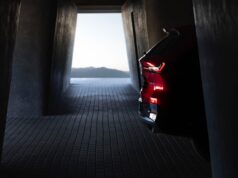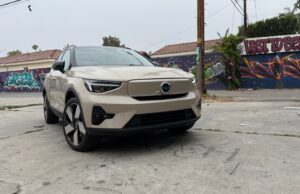This year Ford is entering the competitive electric vehicle segment with its 2012 Ford Focus Electric, which like its main competitor, the Nissan Leaf, runs solely on a battery and electric motor.

This year Ford is entering the competitive electric vehicle segment with its 2012 Ford Focus Electric, which like its main competitor, the Nissan Leaf, runs solely on a battery and electric motor. The 2012 Ford Focus Electric differs from the Nissan Leaf by the fact that it’s design and platform are borrowed directly from a gas powered vehicle. Ford has chosen to electrify the Focus compact hatchback rather than create a stand alone electric vehicle like Nissan did with the Leaf. Since the Focus Electric looks almost identical to the other Focus models and is also produced on the same production line, Ford was able to save development costs and have more flexibility. If the price of oil rises and demand rises for electric vehicles, Ford can easily ramp up production of the Focus Electric.
The 2012 Ford Focus Electric has captured the title of the most fuel efficient five passenger vehicle with its rating of 110 MPGe city and 99 MPGe highway, which also means that it’s more efficient than the Leaf. The EPA also claims that the Focus Electric can travel up to 76 miles on a single charge, but with a starting price of $39,200 (before any tax credits), is it worth it or should buyers save the extra $20k they are paying over the standard gas powered Focus?
For starters rather than give it a quirky exterior like the Leaf, Ford gave the Focus Electric an exterior that is pretty much identical to the gas powered Focus models. So if you like the styling of the Focus, you shouldn’t have any problem with the Focus Electric’s exterior. This may be great for some buyers, but what about buyers that want to stand out more? Since the Focus Electric looks so close to the regular Focus, people will not necessarily know that you are driving an electric car. It’s like the Toyota Prius vs. Honda Civic Hybrid battle, in which many drivers were automatically drawn to the Prius because of its distinct styling, which said “Hey I’m a hybrid!”
Looks aside, since the Focus Electric is so close to the gas-powered Focus, it feels almost exactly like the gas-powered Focus models. Although its electric powertrain adds more weight, which will obviously hurt performance a bit. Ford has yet to release any performance figures for the Focus Electric, but it did have enough power to tackle the hills of downtown San Francisco, at speeds below 40 mph. Obviously getting up to speeds of 60 mph or above is a different story as the Focus Electric starts to lose some momentum as it gets closer to its top speed of 84 mph. But either way, if you plan on only driving the Focus Electric in an urban environment, it’s electric motor is more than able to keep the car going. From a stop light the fact that the Focus Electric’s torque is available immediately made it more enjoyable to drive than some hybrids.
So it has enough power to get around town, but with a range of only 76 miles, you won’t be able to take it very far. Ford is offering a $1,500 240-volt quick charger that will recharge the battery in about 4 hours and with Ford’s smartphone app you can quickly find the closest charging station. Many consumers seem to be concerned about the actual electricity costs associated with electric vehicles. “While in this early electric vehicle market these products have higher up-front costs, knowing how much one can save by using electricity instead of gasoline is an important factor for consumers,” the Union of Concerned Scientists said in a study.
At Ford’s presentation for the Focus Electric, Ford compared the costs of driving a 40 mpg gasoline powered car vs an electric car. An 80 mile trip in a 40 mpg car will burn 2 gallons of gas, which if you live in San Francisco could cost you about $8-9 bucks. The average cost of electricity is around (11¢/kWh), which Ford figures will cost about $2 bucks for an 80 mile trip. The Focus Electric also has a “value charging” function that allows recharging to coincide with the lowest energy rates, which means that you can set it to charge at night when electricity rates are lower. Value charging will lower costs to drive the Focus Electric even further, which Ford estimates to be at around $1 for an 80 mile trip.
Even with its limited range, the Focus Electric is a strong entry into the segment. Ford obviously isn’t expecting overwhelming demand for the Focus as its dedicated a limited advertising budget for the Focus Electric and interested buyers will have to order it. Rather than have a row of Focus Electric’s sitting on dealer lots, Ford is going to use a “build-to-order” sales model. Ford dealers will have one demonstration vehicle on hand and buyers will have to wait four to six weeks later to take delivery of their Focus Electric.
At $40k before the available state and federal tax credits is the Focus Electric worth its higher sticker price over the gas-powered Focus? Sure it emits zero emissions and its owners will never have to stop at a gas station, but with a range less than 100 miles most buyers will most likely need to have a second car in their garage for longer trips.













